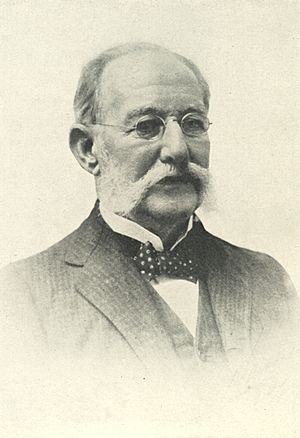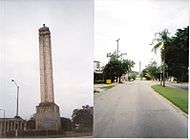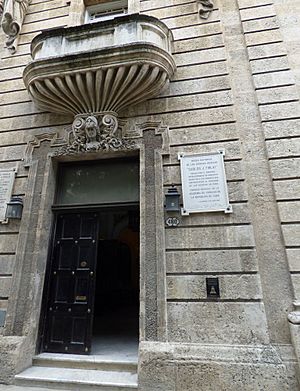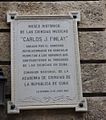Carlos Finlay facts for kids
Quick facts for kids
Carlos Finlay
|
|
|---|---|
 |
|
| Born |
Juan Carlos Finlay y de Barrés
December 3, 1833 Puerto Príncipe, Cuba
|
| Died | August 20, 1915 (aged 81) |
| Alma mater | Jefferson Medical College |
| Known for | Mosquito and yellow fever research |
Carlos Juan Finlay (born December 3, 1833 – died August 20, 1915) was a Cuban doctor and scientist. He is famous for figuring out how yellow fever spreads. He discovered that tiny mosquitoes called Aedes aegypti carry the disease from one person to another. This was a huge step in understanding and fighting diseases.
Contents
Biography
Early Life and Education
Carlos Finlay was born Juan Carlos Finlay y de Barrés in Puerto Príncipe, Cuba. His father, Dr. Edward Finlay, was from Scotland, and his mother, Elisa de Barrés, was from France. Cuba was part of Spain at that time. Later in his life, he changed his name to "Carlos Juan."
His father was a doctor who had fought alongside Simón Bolívar, a famous leader. Carlos went to school in France when he was 11. He had to return home after two years because he got sick.
He tried to go back to Europe for school in 1848. However, he faced more challenges, including getting sick with typhoid fever. Because his European school credits were not accepted in Cuba, he went to Jefferson Medical College in Philadelphia. He graduated from medical school in 1855.
After finishing his studies, he returned to Havana. He opened a practice focusing on eye care. In 1865, he married Adela Shine. They had three sons together.
Discovering How Yellow Fever Spreads
Carlos Finlay's most important work happened in the 1870s. In 1881, he was the first to suggest that mosquitoes carried the yellow fever germ. He believed that if a mosquito bit someone with yellow fever, it could then bite a healthy person and make them sick. This idea was a big deal!
He shared his theory at a large meeting of health experts in 1881. A year later, he identified the specific mosquito, an Aedes mosquito, that spread yellow fever. He then suggested that controlling these mosquitoes could stop the disease.

His ideas were proven true almost 20 years later by a group of American scientists led by Walter Reed. Reed himself gave Finlay full credit for discovering how yellow fever was spread. Reed often mentioned Finlay's work in his own writings.
From 1902 to 1909, Finlay became the chief health officer in Cuba. His discovery was very important for building the Panama Canal. Before his work, many workers died from malaria and yellow fever. Thanks to Finlay's findings, doctors like William C. Gorgas could control these diseases. This made it possible to finish the canal.
Finlay was a smart man who spoke many languages, including French, German, Spanish, and English. He also knew Latin. He wrote about many different topics, from leprosy to gravity. But his main focus was always yellow fever. Even though his ideas were laughed at for years, he kept working. He was nominated seven times for the Nobel Prize in Physiology or Medicine but never won. He did receive a special award from France in 1908.
Carlos Finlay passed away in Havana on August 20, 1915, after a stroke.
Legacy
Honoring a Great Scientist
Carlos Finlay's work left a lasting impact. In 1928, Cuba created the National Order of Merit Carlos J. Finlay. This is the highest award for contributions to health and medicine in Cuba.
In 1962, the Cuban government opened a medical history museum in Old Havana to honor him. A plaque at the museum says it was created to remember "the men who contributed to the advance of the sciences in Cuba."
There is also a monument shaped like a syringe in Marianao, a part of Havana. It is often called El Obelisco (The Obelisk) and honors Finlay. He was also featured on a Cuban stamp in 1981. In Panama City, there is a statue of Finlay near the canal, recognizing his help in its construction.
The UNESCO Carlos J. Finlay Prize for Microbiology is named after him. This prize celebrates important work in microbiology. On December 3, 2013, Google honored him with a special drawing called a Google Doodle on his 180th birthday. The Carlos J. Finlay Military Hospital and the Finlay Institute for Vaccines in Cuba are also named after him.
See also
 In Spanish: Carlos Juan Finlay para niños
In Spanish: Carlos Juan Finlay para niños
- Healthcare in Cuba
- Health measures during the construction of the Panama Canal
Images for kids
 | Calvin Brent |
 | Walter T. Bailey |
 | Martha Cassell Thompson |
 | Alberta Jeannette Cassell |



